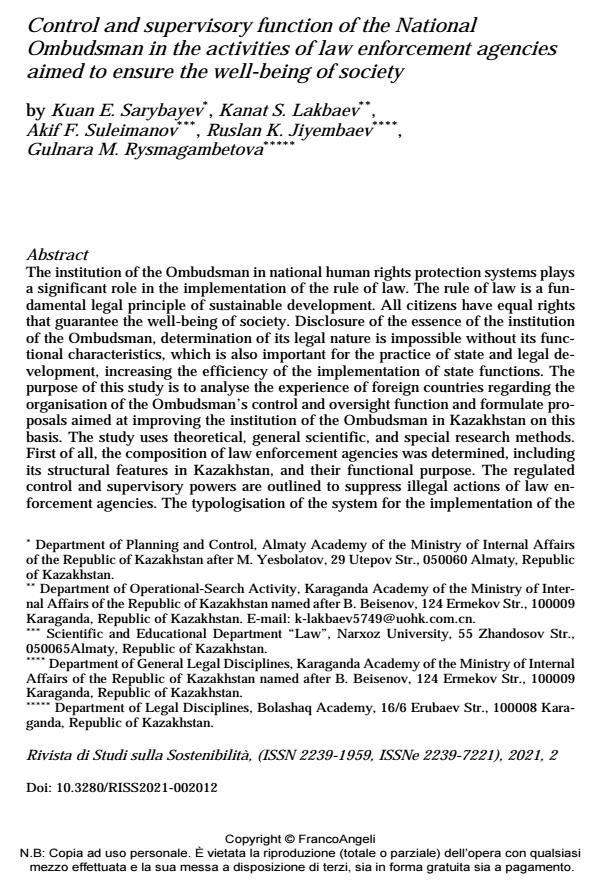Control and supervisory function of the National Ombudsman in the activities of law enforcement agencies aimed to ensure the well-being of society
Titolo Rivista RIVISTA DI STUDI SULLA SOSTENIBILITA'
Autori/Curatori Kuan E. Sarybayev, Kanat S. Lakbaev, Akif F. Suleimanov, Ruslan K. Jiyembaev, Gulnara M. Rysmagambetova
Anno di pubblicazione 2022 Fascicolo 2021/2
Lingua Inglese Numero pagine 15 P. 155-169 Dimensione file 169 KB
DOI 10.3280/RISS2021-002012
Il DOI è il codice a barre della proprietà intellettuale: per saperne di più
clicca qui
Qui sotto puoi vedere in anteprima la prima pagina di questo articolo.
Se questo articolo ti interessa, lo puoi acquistare (e scaricare in formato pdf) seguendo le facili indicazioni per acquistare il download credit. Acquista Download Credits per scaricare questo Articolo in formato PDF

FrancoAngeli è membro della Publishers International Linking Association, Inc (PILA), associazione indipendente e non profit per facilitare (attraverso i servizi tecnologici implementati da CrossRef.org) l’accesso degli studiosi ai contenuti digitali nelle pubblicazioni professionali e scientifiche.
The institution of the Ombudsman in national human rights protection systems plays a significant role in the implementation of the rule of law. The rule of law is a fundamental legal principle of sustainable development. All citizens have equal rights that guarantee the well-being of society. Disclosure of the essence of the in-stitution of the Ombudsman, determination of its legal nature is impossible without its functional characteristics, which is also important for the practice of state and legal development, increasing the efficiency of the implementation of state func-tions. The purpose of this study is to analyse the experience of foreign countries regarding the organisation of the Ombudsman’s control and oversight function and formulate proposals aimed at improving the institution of the Ombudsman in Kazakhstan on this basis. The study uses theoretical, general scientific, and special research methods. First of all, the composition of law enforcement agencies was determined, including its structural features in Kazakhstan, and their functional purpose. The regulated control and supervisory powers are outlined to suppress il-legal actions of law enforcement agencies. The typologisation of the system for the implementation of the control and supervisory function in the activities of law enforcement agencies was carried out according to its subject composition. The structural and functional features of all the noted forms and levels of implementa-tion of the control and oversight function are considered, with the allocation of the Commissioner for Human Rights in Kazakhstan as the leading subject. The analy-sis of the dynamics of quantitative and qualitative indicators of the activities of the Ombudsman of Kazakhstan in the process of implementing the control and supervisory function in the activities of law enforcement agencies. The national preventive mechanism as one of the forms of public control of the institutions of the law enforcement system of Kazakhstan is investigated, the effectiveness of its implementation is assessed.
Parole chiave:ombudsman, law and order, legislative framework, human rights and freedoms.
- The Role of National Human Rights Institutions in the Protection of Human Rights Almaz Syzdykov, Zhanna Iskakova, Bekmyrza Karazhan, Bakizhan Seidesh, Daniyar Mukanov, in Journal of Human Rights and Social Work /2025 pp.836
DOI: 10.1007/s41134-025-00403-w
Kuan E. Sarybayev, Kanat S. Lakbaev, Akif F. Suleimanov, Ruslan K. Jiyembaev, Gulnara M. Rysmagambetova, Control and supervisory function of the National Ombudsman in the activities of law enforcement agencies aimed to ensure the well-being of society in "RIVISTA DI STUDI SULLA SOSTENIBILITA'" 2/2021, pp 155-169, DOI: 10.3280/RISS2021-002012